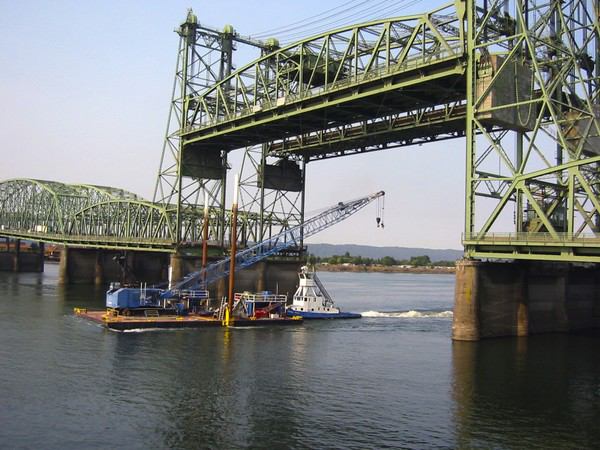Vancouver's City Council unanimously threw its support Monday behind building a new Interstate 5 bridge spanning the Columbia River with separated transit and improved bike and pedestrian facilities.

An Interstate Bridge lift in an Oregonian file photo
Almost five years after the Columbia River Crossing officially died despite nearly $190 million worth of planning over more than a decade, Vancouver's city leaders voted Monday to try to revive the bridge project. But the city appeared to leave the door open for bus-rapid transit in lieu of light rail - a point of conflict through the years.
"This is an important first step in moving the I-5 bridge project forward," Vancouver Mayor Anne McEnerny-Ogle said in a statement. "The replacement of the bridge will be critical to the continued economic growth of the bi-state region."
Oregon and Washington were supposed to spend $450 million apiece to build a new bridge, redesign several interchanges on either side of the river and bring light rail to Washington state. But conservative Washington legislators derailed the effort in 2013.
Oregon tried to go it alone before abandoning the bridge plan the next year. McEnerny-Ogle, who just started her tenure as mayor in January, has said publicly that Washington state "screwed up" by declining to fund the bridge project.
A lot isn't in the three-page document approved by Vancouver's City Council. There's no mention of tolling I-5 or I-205, an unpopular proposal in Clark County political circles, even as Oregon's Transportation Commission is expected to seek federal tolling approval later this year.
The council's nonbinding resolution also doesn't include the words "Columbia River Crossing," but the document does share a lot of the similarities with the failed plan to replace the aging span that started in the 1990s and would've cost upwards of $3 billion.
The document cites the bridge as an area of "national significance," which includes two major ports and is home to "some of the most severe congestion along the entire length of the I-5 corridor."
The Interstate Bridge is "functionally obsolete," the city says. It's also a rare drawbridge spanning two large cities and a heavily used river on the U.S. interstate system
Vancouver officials cited the public transit service as "inadequate to meet demand" and said the existing bus service "operates in mixed-traffic," causing delays.
The resolution does not specify light rail as the desired option -- the failed Columbia River Crossing option would have extended light rail to Clark College. Instead it cites "high capacity transit with a dedicated guideway," potentially leaving the door open for bus-rapid transit.
Vancouver officials are asking Washington Gov. Jay Inslee and the Legislature to "provide adequate funding" to kickstart project development.
Sophia June, Portland Mayor Ted Wheeler's spokeswoman, said it was "too early to tell" what will happen with the effort, but Wheeler is "interested in seeing what develops."
Nikki Fisher, a spokeswoman for Gov. Kate Brown, said the development was "an encouraging step from our partners in Washington."
"We are committed to meeting the needs of Oregon by investing in seismic safety infrastructure and transit to reduce congestion and move Oregon forward," she said."
In an interview, Oregon Senate President Peter Courtney, D-Salem, called the Vancouver council's resolution "a surprise."
He said he's ready to get back to the negotiating table. "It's time for Oregon and Washington to begin working again on a joint project to replace the I-5 bridge over the Columbia River," Courtney said in a statement. "The I-5 bridge is vital to moving our people and our products. We need to put the history on this project behind us and begin working together toward the future once again."